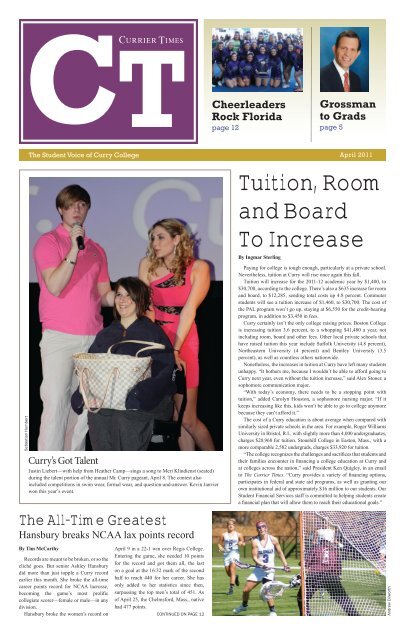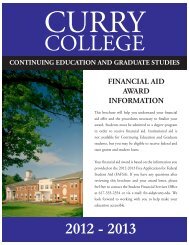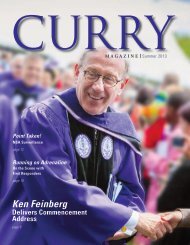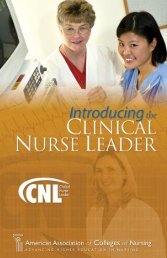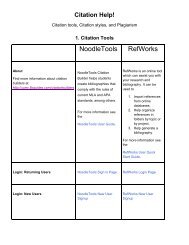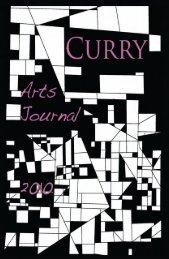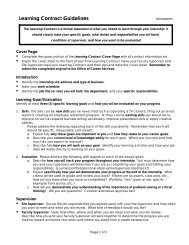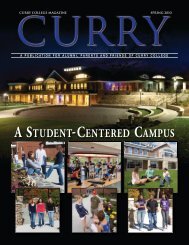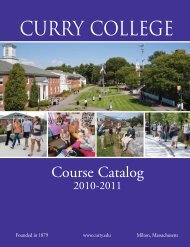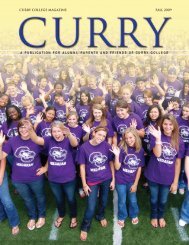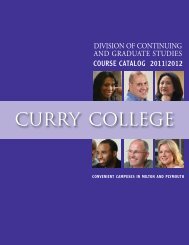Tuition, Room and Board To Increase - Curry College
Tuition, Room and Board To Increase - Curry College
Tuition, Room and Board To Increase - Curry College
Create successful ePaper yourself
Turn your PDF publications into a flip-book with our unique Google optimized e-Paper software.
2 THE CURRIER TIMES APRIL 2011Campus LifeClicking Through Memory Lane<strong>Curry</strong> digitizes yearbook archiveBy Andrew BlomDid you know that <strong>Curry</strong> once had a Russian Club, whereenthusiasts of the Russian language got together?How about our Alcohol Beverage Committee, whichactually regulated <strong>and</strong> served alcohol at on-campus functions?Did you know that Stevie Wonder once performed for <strong>Curry</strong>students?Now, <strong>Curry</strong>’s history over the past 50 years can be viewedonline—free of charge—through a new archival systemlocated at www.archive.org/details/currycollege. LevinLibrary’s interim director, David Miller, <strong>and</strong> the college’sOffice of Institution Advancement collaborated in the effort.The project to digitize copies of The Amethyst, as <strong>Curry</strong>’syearbook is currently known, <strong>and</strong> its many predecessors costabout $2,000, a price that is exceptionally low, according toMiller, considering the high quality of the work. The decisionto digitize the yearbooks stemmed from “great interest fromcurrent students as well as alumni,” he added.The project also included a partnership with InternetArchive, a nonprofit digital library that provides free accessto audio, video <strong>and</strong> texts. Internet Archive hosts the site where<strong>Curry</strong>’s yearbooks reside.Pages of <strong>Curry</strong> history can now be found online, such as this spread from the 1970 yearbook that chronicles <strong>Curry</strong>’s WinterWeekend party, where singer Stevie Wonder performed for students.Hungry for ChangesSome students stew over quality of after-hourcuisine, limitations in food points systemBy Sam ZaporaWhen it comes to convenience with<strong>Curry</strong>’s dining services, the systemmisses a few points.Before the Student Center was erectedtwo years ago, <strong>Curry</strong> students ate theirfill in the Drapkin Building. If classesran late, one could go to the late-nightwindow <strong>and</strong> get an equivalency: freshlyprepared late-night menu food, includingchicken tenders <strong>and</strong> mozzarella sticks,for the price of one’s dinner meal point.This option, however, has disappearedwith the advent of the new dining area.The Marketplace is currently made upof several food stations where studentscan obtain a wide variety of cuisine. At7 p.m., most of the remaining food—leftover pizza, pasta <strong>and</strong> grilled cheese,for example, in addition to freshlyprepared food from the grill, such asburgers <strong>and</strong> hotdogs—is placed at theFlame Grill. There, students can choosefrom the “Limited Menu” until 9 p.m., atwhich time the Marketplace closes down<strong>and</strong> the late-night window opens.Students may use one of their pre-paidweekly meal points during each mealperiod, composed of breakfast, lunch<strong>and</strong> dinner. In addition to meal points, aseparate set of alternative prepaid pointsexist that are based on the size of astudent’s meal plan. However, meal pointsthat are not used within a week’s timedon’t carry over to subsequent weeks.“Students have ample time to use theirdinner point within the time allotted,”said Keith Meal, general manager of the<strong>Curry</strong> Dining Service, which is operatedby Sodexo. “The late-night window isintended for snacking. We would assumethat students would have eaten dinner bythen.”Some students, such as a juniorcommunication major Pat Matthews,said it’s often difficult to get fresh foodafter classes <strong>and</strong> work. “Equivalency [atDrapkin] was great,” he said. “I have alot of night classes <strong>and</strong> radio duties, soall that’s left at 8 are dinner’s leftovers.”The late-night window functionsmuch like the other on-campus snackareas, found in Hafer <strong>and</strong> Kennedy.Students pay for their food using cash,credit or alternative meal points; onemay not redeem a main meal point forfood.The ability to get nightly entrees wasrecently extended to 8 this semester, dueto the football team requesting heartiermeals after practice, said Meal. Asfreshman IT major Cody Smith pointedout, however, that timeframe isn’talways consistent.“I see the staff cleaning up theirstations <strong>and</strong> shutting down as early as6:30 sometimes,” he said. “For manyentrees, it comes down to first come, firstserve.”Meal encouraged students to sharetheir opinions about on-campus diningvia the comment board next to the traybussing station in the Student Center.“Students can also talk to a manager,” headded. “If you see us on the floor, we’rethere to answer your questions <strong>and</strong> hearyour comments.”Petit Wins SGA PresidencyBy SebastianHumbertNatalie Petit waselected president of theStudent GovernmentAssociation, defeatingKyle Berliner to replaceoutgoing SGA headLorraine Dougherty.Allison Pintowon her election forsecretary of the group’sexecutive board, but noother positions werechallenged.Connell Wise ranuncontested for thevice president spot, asdid Andrew Rezendesfor treasurer. For classofficer positions, only the Class of2014 had c<strong>and</strong>idates. Winners areCorey Theodore (president), LaurenStafford (vice president), NicholasColicchio (treasurer) <strong>and</strong> StephanieJones (secretary).No one ran for any positionsrepresenting the Class of 2012or the Class of 2013, meaningadditional elections will need to beheld in the fall, when freshman classc<strong>and</strong>idates will also run for officerpositions.Petit attributed the apathy to thelack of publicity the SGA receiveson campus. She said some studentshad expressed interest in running, butnever followed up with the petitionto do so. “They were not aware ofSenior Natalie Petit, a politics <strong>and</strong> history major, wonthe student election April 21 to become the newexecutive board president of the SGA.the date,” she said. “They have thechance to run again, though.”Petit said her goals for the 2011-2012 year are to get the SGAmore involved with the campusby holding community meetings,<strong>and</strong> to get a “more publicizedorganization so that people will runagain” the following year. She alsosaid it’s important for SGA membersto help students underst<strong>and</strong> whatthe association does. The grouprepresents students’ concerns <strong>and</strong>interests to the administration acrossa range of issues, from academic tocultural, safety to social.The SGA is funding free massagesfor students <strong>and</strong> an ice cream truckon campus for reading day, Tuesday,May 3.
4 THE CURRIER TIMES APRIL 2011<strong>Curry</strong> Web SiteGets a Face LiftBy Erin PowersAs the current school year comes toa close, some changes at <strong>Curry</strong> are onthe horizon...<strong>and</strong> on the Web. A majorredesign of the college’s Web site hasbeen underway for about a year now, <strong>and</strong>finishing touches are about all that’s left.With prospective students increasinglyusing the Internet to evaluate their collegeoptions, it was imperative that <strong>Curry</strong>’ssite receive a face lift of sorts, said FranJackson, director of communication at<strong>Curry</strong>, whose office led the redesigneffort. The current Web site, www.curry.edu, was launched in 2004 with aMicrosoft content management systemthat is now out of date. So, last May, thecollege decided it was time for a change<strong>and</strong> began a yearlong, multi-phasedproject that is expected to launch bysemester’s end.“The design of the new templates allowfor the use of much larger images,” saidJackson. “These templates help reflect the‘feel’ of the campus by showing dynamicphotography of students <strong>and</strong> facilities thatwill aid prospective students in picturingthemselves at <strong>Curry</strong> <strong>College</strong>.”According to a 2010 survey of highschool students by the enrollmentmanagementconsulting firm Noel-Levitz, 24 percent said theydidn’t apply to a particularcollege because they had a badexperience on that college’sWeb site, namely not findingthe information they wanted.Online applications, campus visitrequest forms, cost calculators—afederal requirement starting in thefall—<strong>and</strong> online course catalogswere the most desirable content,students reported.In addition to forms <strong>and</strong> data,<strong>Curry</strong>’s new Web site—to launchin May—will offer a plethora ofvisuals <strong>and</strong> videos in an effortto “show, not tell,” according toJohn Eagan, <strong>Curry</strong>’s Web administrator.If a prospective student wanted to checkout the fitness center of the gym, forexample, they will soon have the optionto watch a video or take a virtual tour. Andinstead of reading a lengthy paragraphabout the new Student Center, users willbe able to simply scroll through a seriesof photos—the site will use a carrouselsystem for some photos, allowing iPhoneusers to scroll via touch-screen—orwatch a short video describing what thebuilding has to offer.The Noel-Levitz survey found that 52<strong>Curry</strong>’s new Web site, to launch in May, will feature more videos <strong>and</strong> photography to capture the feel ofthe campus <strong>and</strong> the interest of prospective students.percent of students reported watchingvideos about a prospective college, butonly 10 percent said they did so viaYouTube. Videos about student life <strong>and</strong>academics ranked the highest in studentinterest, at 46 percent <strong>and</strong> 30 percent,respectively.“We believe the new site will be highlyusable <strong>and</strong> functional, with intuitive,direct <strong>and</strong> logical navigation,” saidJackson.Jackson said the process took a yearbecause it wanted to repeatedly gauge theneeds <strong>and</strong> wants of students, faculty, staff<strong>and</strong> administrators. The Web redesignteam questioned many different groups,searching for anecdotal feedback in aneffort to form a significant road map thatwould eventually sculpt an effective Website, she added.The new site will use Ingeniux as itscontent-management system, enablinggreater flexibility in adding newinformation online. “The CMS facilitatescollaboration with all departmentsacross campus in updating the Website,” said Jackson, “collaboration whichis critically important to keep the sitecurrent <strong>and</strong> engage visitors to returnagain <strong>and</strong> again.”Ingmar Sterling<strong>To</strong>o Cool for PoolBy Andrew Blom“Everyone in the Pool!” It’s a phrase common aroundoutdoor swimming facilities, but not the swimming poolhere at <strong>Curry</strong>.“We have a pool?” asked Mike Warner, a sophomoreEnglish major.The outdoor swimming pool, located on North Side,next to the outdoor basketball courts, is not filled duringthe academic school year, but will soon be in use for thesummer months. According to Building & Grounds, the ingroundpool was built in the early 1970’s, originally as partof a contract with summer conferences <strong>and</strong> sports camps.Since then, the pool has been filled regularly duringthe summer months, from mid-June to late August at thelatest. During these months, the fenced-off pool is used forSummer PAL, traditional students taking summer courses,<strong>and</strong> campers here for athletics or cultural opportunities inthe Greater Boston area. The pool is in high dem<strong>and</strong> duringthese months, <strong>and</strong> a lifeguard is on duty full time.But according to some students, the pool should alsobe made available during the school year. “It should beopened if we could use it appropriately, which is hard for alot of us,” said Erin Cooney, a junior education major.Of course, the weather in Massachusetts has somethingto do with the limited schedule, as it still gets cold in April.The pool carries no costs to students while it remainsclosed, said Richard Sullivan, the college’s chief financialofficer, <strong>and</strong> it helps produce revenue in the summer as anadditional draw for summer camps to choose <strong>Curry</strong>.Housing Selection LeavesLittle <strong>Room</strong> for ImprovementNew processes get good marks from students, staffersBy Conor McDonaldIn years past, the housing selection process at <strong>Curry</strong>could make even the calmest of students want to pullout their hair in frustration. Long lines <strong>and</strong> a gymovercrowded with annoyed students led to a stressfulenvironment.But according to those who took part in this year’shousing selection process, on April 6 <strong>and</strong> 7, thingsactually went relatively smoothly. Residence Lifereported that they processed 760 students during thecourse of both nights.Unlike last spring, when somestudents were in the StudentCenter gym until midnighttrying to find out where theywould be living, this year’sprocess ended at 10 on bothselection nights. Long lines weregenerally avoided <strong>and</strong> there were minimal issues, saidErik Muurisepp, director of Residence Life & Housing,who called it “a huge leap from last year.”Although the actual selection days went smoothly,students were left waiting in anticipation to find outtheir lottery numbers. A delay pushed back the lotterynumber notification date from Monday, March 28 toFriday, April 1. The Web portal described the delay as“technical difficulties.”Muurisepp said the delay was caused by the newonline payment system. This year, students could paytheir deposits online instead of having to go the financialoffice. “We wanted to offer students the option to payonline at any time, not just when the finance departmentwas open,” he said.Also new to this year’s housing selection processwas the suite application form, which was used to make“I wouldn’tchange anything.”sure that all students had paid their housing depositson time. In years past, many students found out onlyon housing selection night that they could not choosea suite because they failed to pay their deposits. Thiswould leave students scrambling to find another personto fill their suite.The new form was due April 4 <strong>and</strong> gave ResidenceLife the chance to verify eligibility. Muurisepp said hewas pleased with this addition because it gave students achance to rectify a situation before it became a problem.“I think it helped tremendously,” he said.It also drastically removed theamount of people that needed tobe in the gym. This year, only oneperson—deemed a “suite leader”—had to go to selection night. Thisled to a much more efficient, fastermovingsystem that helped thehousing selection process end earlier, Muuriespp said.“It was organized, for the most part,” said sophomorebusiness major, Ethan Lanoff, who was happy with hisroom in The Suites. “I wouldn’t change anything. It wasgood.”Some first-year students, however, said they foundthe process a bit intimidating. “I got a decent lotterynumber, but the actual process of housing selectionwas nerve-racking,” said freshman Devin Lucy, anursing major. “I didn’t want to get stuck with anawful room I would have to live in for a year.” Shesaid she was hoping to get a corner room in 886, butwas not able to.As for next year, Muurisepp said he hopes toimprove communication with students about deadlines,especially the housing deposit. Late deposits caused themost problems for students this year, he added.— sophomore Ethan Lanoff
APRIL 2011 THE CURRIER TIMES 5State Treasurer to GiveCommencement Address<strong>Curry</strong> graduationceremony May 15Courtesy PhotoBy Nick IronsideSteve Grossman, the treasurer of theCommonwealth of Massachusetts, will givethis year’s commencement address at <strong>Curry</strong>’sgraduation ceremony May 15. Grossman,who was the CEO <strong>and</strong> chairman of GrossmanMarketing Group in Somerville prior to beingelected state treasurer in 2010, has long beenactive in Democratic politics, but it’s his familythat he speaks of with the greatest passion.Grossman has made his living throughthe family business, formerly known as theMassachusetts Envelope Company, that hisgr<strong>and</strong>father started in 1910. He says he workedh<strong>and</strong>-in-h<strong>and</strong> with his father, Edgar, for 25years, <strong>and</strong> “never had an argument.” Whenhis dad passed away in 1999, Grossman tookcontrol of the business <strong>and</strong> h<strong>and</strong>ed over the dayto-daymanagement of the company to his twooldest sons, David <strong>and</strong> Ben, after winning publicoffice last year.A longtime Newton, Mass., resident,Grossman received his undergraduate degreefrom Princeton University <strong>and</strong> an MBA fromthe Harvard Business School. Outside of thefamily business, he served as chairman ofthe Massachusetts Democratic Party, servedthree years as the chairman of the DemocraticNational Committee under President BillClinton, was president <strong>and</strong> chairman of the pro-Israel lobbying group AIPAC, <strong>and</strong> served asthe national chairman of former Vermont Gov.Howard Dean’s 2004 presidential campaign.He recently spoke to The Currier Times inanticipation of his commencement address.CT: When you first started working in the “realworld,” what surprised you the most?Grossman: At the end of the day, if you want tosucceed in business, it’s all about the customer<strong>and</strong> there are four things you must offercustomers at all times: great service, qualityof the product, value for their money, <strong>and</strong>professionalism every step of the way.If <strong>Curry</strong> <strong>College</strong> wants you to leave after fouryears having had a really positive experience,they have to give you the same things.CT: What are the three most important attributesfor a person to have to be successful in theworking world?Grossman: They have to remember that themost important word in the English language isthe word “we,” <strong>and</strong> the least important word isthe word “I.” Successful people are successfulbecause they are part of teams.No. 2 is be a great listener. My father toldme many, many years ago, ‘Steve, you wereborn with one mouth <strong>and</strong> two ears. Use themin that proportion.’ Listeners learn, <strong>and</strong> goodlisteners take what they learn <strong>and</strong> implement itsuccessfully.The third principle is, when you don’t knowthe answer to a question, don’t make oneup. Humility is a very important quality todemonstrate in everything that you do.CT: What is your most vivid college memory?Grossman: It was all about the relationshipsI built. There’s a quote from the great IndianNobel Prize-winning author RabindranathTagore—Rabindranath Tagore won the NobelPrize around the turn of the 20 th century—<strong>and</strong>he said, ‘All life is relationships.’I built a lifetime of relationships in my yearsin college, <strong>and</strong> I continue to maintain thoserelationships with people I haven’t seen in yearsbut still talk to on the phone, <strong>and</strong> people I see allthe time at various places. Those relationshipsreally made college a memorable experiencebeyond the quality of the education that I got.Ten Years of <strong>Curry</strong>Commencement Speakers2010: Richard J. Daniels,president <strong>and</strong> chief executive officerof GateHouse Media New Engl<strong>and</strong>2009: Joan Wallace-Benjamin,president <strong>and</strong> chief executive officerof The Home for Little W<strong>and</strong>erers2008: Donald E. Rodman,president of Rodman Ride forKids <strong>and</strong> Rodman Ford, Lincoln-Mercury2007: Dr. David A. Fedo,<strong>Curry</strong> <strong>College</strong>’s retiring vicepresident <strong>and</strong> academic dean2006: Timothy P. Cahill,Massachusetts State Treasurer <strong>and</strong>Receiver General2005: Rep. Stephen F. Lynch,Democratic congressman(9 th district)2004: Jack Williams,Emmy Award-winning CBS4Boston news anchor2003: Jeffrey <strong>To</strong>obin,Emmy Award-winning writer <strong>and</strong>ABC-CNN legal analyst2002: Dr. Michael F. Collins,president <strong>and</strong> chief executive officerof the Caritas Christi Health CareSystem, Chief Justice Margaret H.Marshall, Massachusetts SupremeJudicial Court, <strong>and</strong> John J. Santilli,chairman of the <strong>Curry</strong> board oftrustees <strong>and</strong> president of the Centerfor Automobiles2001: Dr. John P. Hamill,chairman <strong>and</strong> chief executiveofficer of Sovereign Bank NewEngl<strong>and</strong>, <strong>and</strong> Thomas W. Payzant,superintendent of the Boston PublicSchool systemCourtesy Photo<strong>Curry</strong> to HonorRuth Ellen FitchRuth Ellen Fitch will receivean Honorary Doctorate degreeat <strong>Curry</strong> <strong>College</strong>’s 2011commencement ceremony,May 15.Fitch is president <strong>and</strong>CEO of the Dimock Center,located in Boston. The Centerprovides health <strong>and</strong> humanservices to communities inthe Boston urban area.Before her current job,Fitch spent more than 20years practicing law.Look WhoElse Is TalkingBabson <strong>College</strong> (Wellesley, Mass.):Biz Stone, co-founder of Twitter, <strong>and</strong>William Drayton, founder <strong>and</strong> CEOof Ashoka: Innovators for the PublicEndicott <strong>College</strong> (Beverly, Mass.):Baroness Sue Campbell, Comm<strong>and</strong>erof the Order of the British EmpireLasell <strong>College</strong> (Newton, Mass.):Sen. Scott Brown, Republican U.S.Senator from MassachusettsQuinnipiac University (Hamden,Conn.): Mitch Albom, Detroit FreePress sports columnist <strong>and</strong> book authorRegis <strong>College</strong> (Weston, Mass.):Liz Walker, ordained minister <strong>and</strong>former WBZ-TV news anchorWheaton <strong>College</strong> (Norton, Mass.):Richard Stengel, managing editorof Time magazineWheelock <strong>College</strong> (Boston, Mass.):Mary Robinson, former presidentof Irel<strong>and</strong> <strong>and</strong> former UnitedNations High Commissionerfor Human Rights


